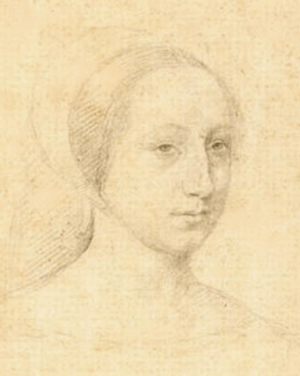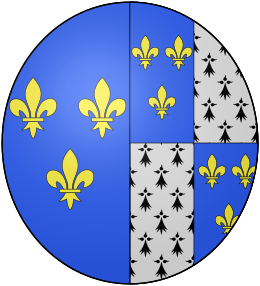Claude of France facts for kids
Quick facts for kids Claude |
|
|---|---|

Contemporary image of Claude, c. 1520
|
|
| Duchess of Brittany | |
| Reign | 9 January 1514 – 26 July 1524 |
| Predecessor | Anne |
| Successor | Francis III |
| Queen consort of France | |
| Tenure | 1 January 1515 – 20 July 1524 |
| Coronation | 10 May 1517 |
| Born | 13 October 1499 Romorantin-Lanthenay |
| Died | 20 July 1524 (aged 24) Château de Blois |
| Burial | Saint Denis Basilica |
| Spouse | |
| Issue more... |
|
| House | Valois-Orléans |
| Father | Louis XII of France |
| Mother | Anne, Duchess of Brittany |
Claude of France (born 13 October 1499 – died 20 July 1524) was an important royal figure in France. She was the ruling Duchess of Brittany from 1514 until her death. She also became Queen of France when she married King Francis I in 1514. This was just before he became king after her father died. Claude was the daughter of King Louis XII of France and his second wife, Anne of Brittany, who was the Duchess of Brittany in her own right.
Contents
Life of Claude
Claude was born on 13 October 1499 in Romorantin-Lanthenay, France. She was the oldest daughter of King Louis XII and Duchess Anne of Brittany. Her mother had many pregnancies, but only two children survived to adulthood: Claude and her younger sister, Renée, who was born in 1510.
Why was Claude so important?
Because her mother, Anne, had no sons who lived, Claude was the next in line to inherit the Duchy of Brittany. However, the crown of France could only be passed down to male heirs. This was due to a rule called Salic law.
Her mother, Queen Anne, wanted Brittany to remain separate from France. So, she planned for Claude to marry Charles V. He was a powerful prince who would later become the Holy Roman Emperor.
However, some people in France wanted Brittany to stay connected to the French crown. They supported Claude marrying Francis, Duke of Valois. He was the next in line to the French throne.
In 1501, a marriage contract was signed for Claude to marry Charles V. This contract said that Claude would bring Brittany as part of her inheritance. It also mentioned other lands like Milan and Burgundy. This agreement set the stage for future conflicts between Charles V and Francis I.
Later, in 1505, Claude's father, King Louis XII, became very ill. He worried about the future of France. He decided to cancel Claude's engagement to Charles V. Instead, he wanted her to marry Francis, the Duke of Valois. This decision helped ensure that Brittany would stay linked to France.
Duchess and Queen
On 9 January 1514, Claude's mother died, and Claude became the Duchess of Brittany. Just four months later, on 18 May, at the age of 14, Claude married her cousin Francis. This marriage was important because it helped keep Brittany united with the French crown.
King Louis XII died on 1 January 1515. This meant Francis and Claude became the new King and Queen of France. Claude was the third Duchess of Brittany to also become Queen of France.
As Duchess of Brittany, Claude let her husband manage the affairs of the Duchy. She did not want Brittany to become fully part of France. Instead, she named her oldest son as the heir to the Duchy.
Life as Queen
As Queen, Claude was often overshadowed by her mother-in-law, Louise of Savoy, and her sister-in-law, Margaret of Angoulême. Claude never directly ruled Brittany. In 1515, she gave her husband control over her lands. She seemed more interested in her religious duties than in politics.
Several important people were part of Claude's royal household. Anne Boleyn, who later became Queen of England, served Claude. It is thought that Anne helped Claude communicate with English visitors, especially during important events like the meeting at the Field of Cloth of Gold in 1520. Another lady in Claude's court was Diane de Poitiers. Diane later became a very influential figure and a lifelong companion to Claude's son, Henry II.
Claude was crowned Queen of France at St. Denis Basilica on 10 May 1517.
Claude had many pregnancies during her marriage. Her husband, King Francis, was known to have other relationships, but he was usually discreet about them. Claude kept a strict moral code for her own household.
A historian named Brantôme wrote about Claude. He said she was "very good and very charitable, and very sweet to everyone." He also mentioned that her parents, King Louis and Queen Anne, loved her deeply.
Claude was short and had a curved spine, which made her back appear hunched. Her many pregnancies also made her look plump. Foreign visitors noted her appearance, but they also recognized her good qualities.
Death
Claude died on 26 July 1524 at the Château de Blois. She was only twenty-four years old. She was buried at St. Denis Basilica.
After her death, her oldest son, Francis, became Duke of Brittany. Her husband, King Francis I, acted as his guardian. When this son died in 1536, Claude's second son, Henry, became the Duke of Brittany and later King of France.
Claude's husband, King Francis I, married again several years later. His second wife was Eleanor of Austria, who was the sister of Emperor Charles V.
Claude's Children
Claude and Francis I had seven children. Two of them lived past the age of thirty:
- Louise (born 19 August 1515 – died 21 September 1518): She died young.
- Charlotte (born 23 October 1516 – died 8 September 1524): She also died young.
- Francis (born 28 February 1518 – died 10 August 1536): He became Duke of Brittany after his mother. He died unmarried and without children.
- Henry II (born 31 March 1519 – died 10 July 1559): He became King of France after his father. He married Catherine de' Medici and had children.
- Madeleine (born 10 August 1520 – died 2 July 1537): She married James V of Scotland but had no children.
- Charles (born 22 January 1522 – died 9 September 1545): He died unmarried and without children.
- Margaret (born 5 June 1523 – died 14 September 1574): She married Emmanuel Philibert, Duke of Savoy and had children.
"Reine Claude" Plum
Claude is remembered today by a type of small, pale green plum. It is still called "Reine Claude" (which means "Queen Claude") in France. In English-speaking countries, it is known as a "greengage."
Images for kids
-
Claude surrounded by her daughters (Charlotte, Madeleine and Marguerite), her sister Renée (or her deceased older daughter Louise) and her husband's second wife Eleanor of Austria, in the Livre d'heures de Catherine de Medicis, 1550. Bibliothèque nationale de France
See also
 In Spanish: Claudia de Francia (1499-1524) para niños
In Spanish: Claudia de Francia (1499-1524) para niños
 | Selma Burke |
 | Pauline Powell Burns |
 | Frederick J. Brown |
 | Robert Blackburn |





